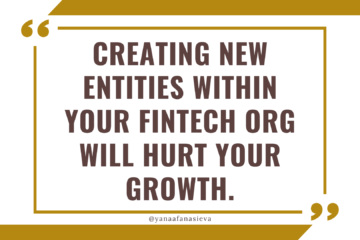Why FinTechs Need Compliance Officers with Exceptional Marketing Skills?
If you are a FinTech founder or a CEO, you are constantly selling and your hardest pitches are not necessarily to customers.
First and foremost, you need to sell your business model, your technology, and your overall concept to regulators, banks, investors, and partners. You often need approvals and permissions and sign-offs from these big wigs WAY BEFORE you can even talk to your customers.
What you do really want as a founder or a CEO is to build and grow a uniquely successful business, to have more customers, to be a global leader, to prepare and execute a successful exit. You want to launch new products, eliminate your competition, and raise more funds.
AND – you want to do all of the above with clarity and confidence and never worry about compliance (ideally – never spend money and time on compliance). You want your compliance to be effortless and invisible (and in the perfect word – free).
When all of that happens, you will feel like you’ve changed the industry and you are the next Elon Musk or Jeff Bezos, and you will have a sense of accomplishment and a true validation of your exceptional leadership and visionary skills.
Your little “problem” is that regulatory or partner approvals for FinTech businesses rely on compliance information and policies much more than they rely on your financial projections or market research or innovative technology. Investors, regulators, and banks often want to know if the thing you are doing is legit before they ask when it will become profitable.
Which is why your business model descriptions and growth opportunities and target market and average transaction size projections will all have a double meaning:
- If it’s too aggressive and growing too fast => you are risking being rejected because of the high risk, which partners or regulators may think you are not ready to manage as a small inexperienced company.
- If it’s too conservative and boring and very compliant and risk-averse => you will look too expensive, too slow, not sufficiently unique and it’s just easier to buy bitcoins than give you money and worry about what may happen.
Regulators, bankers, auditors, investors, and partners are very sophisticated, they have seen it all. And it does not necessarily mean that pitching to them is always hard and slow and difficult.
All I’m suggesting is that when you are approaching sophisticated and busy and experienced stakeholders and you need something from them, your descriptions, your messaging, your presentations must stand out like never before and since descriptions around compliance and security is a big part of the decision-making process, your CCO and your CTO must present their functions and processes in a completely new and groundbreaking way. These functions need to look sexy and innovative. They need to look like a competitive advantage.
There are many ways of doing it, but one that works the best and easiest is to show how your compliance and tech efforts will scale and how for each next customer, you can do more checks and collect more data, and their data and money will be safe and secure but will cost you less than for the previous customer.
Yes, it’s hard to get good people into any function, including compliance, but the most common mistakes I see founders do – they hire compliance people just for their experience or credibility and resume and ignore such things as attitude or personality or ability to communicate clearly and in a non-legalese way. A lot of founders feel their compliance is going to be in good hands if they hire ex- regulators or professionals with a long history of working at large companies or big consultancy firms.
Ex-regulators indeed should know well how to satisfy their ex-colleague’s expectations or what they personally would approve, however, they rarely understand the impact of their recommendations on customers or user experience, and they rarely understand the technology. Which means their recommendations will be disconnected from UX and tech impact. The same applies to ex-consultants.
Experts from large organizations can bring structure and streamline processes, but they often have a very siloed mentality: they are used to a very narrow and specific division of labor and they are used to having a lot of resources. I have once seen an ex- banking compliance officer who came into a startup and created 30 procedures and requested to hire a team of 10 people into compliance when the startup expected to have 100 customers during the first year of operations.
Truth to be told – I have never seen a FinTech project fail because of compliance or being shut down because of compliance (yes, you can get into compliance troubles and overspend there, but it’s rarely terminal) – it’s always either product/market fit, running out of money, wrong partners or bad leadership, however, founders think about compliance as if this is something that’s evil and terrible. Which is another main reason why you should not hire compliance people who cannot sell you on why their function is fantastic – if they don’t love it and enjoy it and can play with it – there is no way they can convince others that your compliance function is brilliant.
Yana Afanasieva
CEO of Competitive Compliance
Want to stay in touch? – Join my weekly newsletter everyone is talking about!


